 Petzlover
Petzlover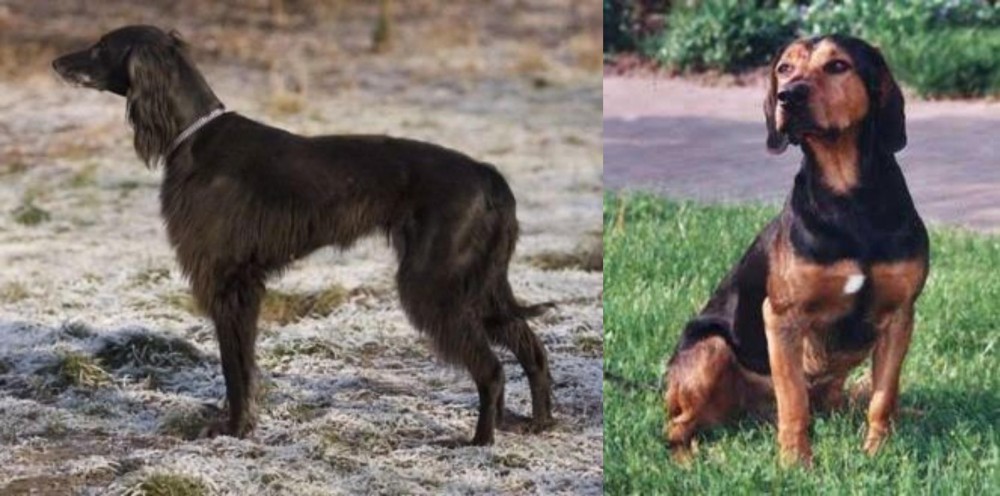 Taigan is originated from Kyrgyzstan but Tyrolean Hound is originated from Austria. Taigan may grow 32 cm / 13 inches higher than Tyrolean Hound. Taigan may weigh 7 kg / 16 pounds more than Tyrolean Hound. Both Taigan and Tyrolean Hound has almost same life span. Both Taigan and Tyrolean Hound has same litter size. Both Taigan and Tyrolean Hound requires Low Maintenance.
Taigan is originated from Kyrgyzstan but Tyrolean Hound is originated from Austria. Taigan may grow 32 cm / 13 inches higher than Tyrolean Hound. Taigan may weigh 7 kg / 16 pounds more than Tyrolean Hound. Both Taigan and Tyrolean Hound has almost same life span. Both Taigan and Tyrolean Hound has same litter size. Both Taigan and Tyrolean Hound requires Low Maintenance.
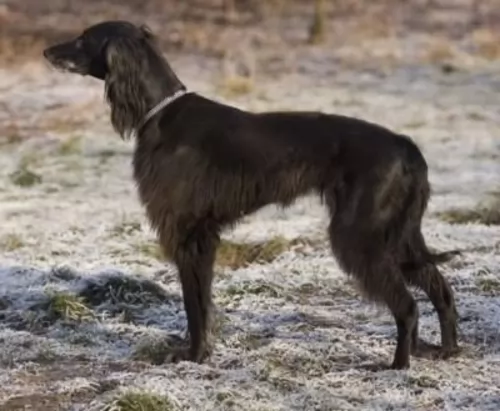 Known also as the Kyrgyzdyn Taighany, the Taigan is a sighthound dog from Kyrgyzstan. Today the dog is recognized by a number of kennel clubs,and more recently by the FCI.
Known also as the Kyrgyzdyn Taighany, the Taigan is a sighthound dog from Kyrgyzstan. Today the dog is recognized by a number of kennel clubs,and more recently by the FCI.
It was after 1991, when Kyrgyzstan became independent, that the role of the dog changed and t became a working dog again.
It was about in 1995 that a new breed standard was adopted, and since 2005 a national kennel club has existed in Kyrgyzstan.
 The Tyrolean Hound, also known as Tyroker Bracke or Tiroler Bracke originates from Tyrol, Austria. It seems the dog was developed in the late 1800s for hunting.
The Tyrolean Hound, also known as Tyroker Bracke or Tiroler Bracke originates from Tyrol, Austria. It seems the dog was developed in the late 1800s for hunting.
This is a scenthound that is thought to have descended from Celtic Hounds, Foxhounds and Bloodhounds in the late 1800s.
The dog is a member of the FCI’s scent hound group. The dog was recognized as its own breed in 1908, and in 2006 it was recognized by the United Kennel Club.
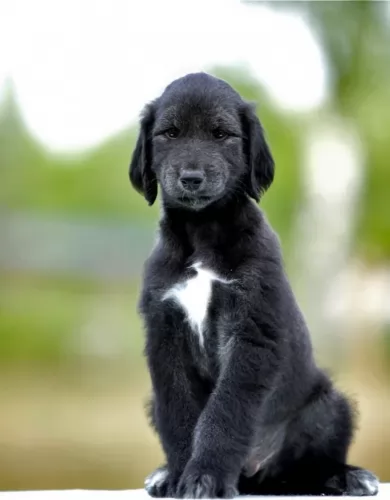 The Taigan is a large dog, looking much like a Grehound. He stands at between 55 and 82cm in height and weighs about 25 - 34kg.
The Taigan is a large dog, looking much like a Grehound. He stands at between 55 and 82cm in height and weighs about 25 - 34kg.
He has that typical slender body and slender head of the greyhound. The coat of the dog is medium length and somewhat curly and can be many colours, sometimes even bi-colored – cream, black and white, brown, grey or yellow.
During the Winter the coat can become long and thick. The ears are floppy and covered with wavy fur. The tail is long and a distinguishing mark of the dog is the way the end of the tail coils up into a ring.
These dogs can’t be kept in small city properties – they are used to wide open spaces.
An intelligent breed, the Taigan will readily learn some basic commands to make him well mannered and obedient. He is strong willed and independent, so it will be beneficial to have him trained.
He also makes a good watchdog. He is an even-tempered dog and he enjoys human companionship although he is somewhat reserved with strangers. Even so, he will still need a strong, firm owner as he is strong-willed and independent and likes to go his own way.
He is able to get along well with children in the home and other pets. Being a fairly large dog, and one that likes to run, he is better suited to large properties in the countryside as opposed to living in the city.
 The Tyrolean Hound is a medium-sized to large dog. He stands at roughly between 43 to 50cm in height and can weigh between 20 and 27kg.
The Tyrolean Hound is a medium-sized to large dog. He stands at roughly between 43 to 50cm in height and can weigh between 20 and 27kg.
He is muscular, lean and compact. The double coat is short and smooth and can be red, tan, black or tri-colored. The ears are high set, are broad, floppy and long. The tail is long and is carried high.
Independent and intelligent the Tyrolean Hound is a hardworking dog, loving to be active. He has all the characteristics of a great pet and companion – loving, lively, intelligent, independent, easily trained and protective.
He’s the kind of dog that would suit a home with a large garden as opposed to living in the city. He is wary of strangers and has a loud bark to warn you of intruders. He has a friendly nature with his human family and makes a good playmate for children.
 The Tyrolean Hound is a keen hunting dog loving to be outdoors and active, requiring large grounds to be happy.
The Tyrolean Hound is a keen hunting dog loving to be outdoors and active, requiring large grounds to be happy.
Once he comes indoors he is able to settle down with his human family and have some quiet time with them.
He is loyal and loving, but you are going to have to be prepared for an active lifestyle with this skilled hunting dog of yours.
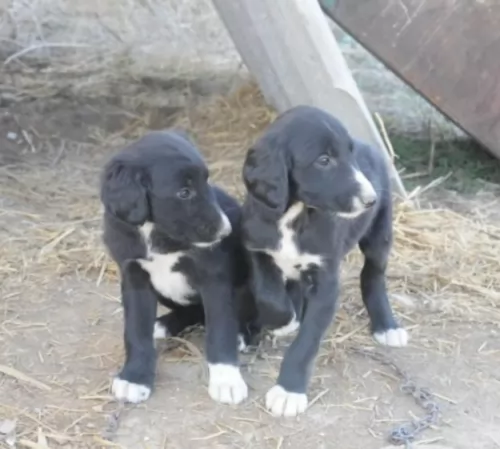 Any dog, no matter how healthy they may appear to be, can encounter any one of the many common dog illnesses there are. It is highly unlikely that your Taigan will experience these health issues but it’s good to be aware of some of them -
Any dog, no matter how healthy they may appear to be, can encounter any one of the many common dog illnesses there are. It is highly unlikely that your Taigan will experience these health issues but it’s good to be aware of some of them -
Also known as osteosarcoma, bone cancer is more commonly seen in large dogs of any breed. It’s a cancer which spreads rapidly through the body and it is terribly sad that the prognosis for your dog is poor.
You might notice swelling, joint pain and lameness and your dog will appear to always be tired. Sometimes you might see a growth. Your vet might do x-rays and if you catch it early, you can give your pet a longer lease on life.
 Because these dogs put everything into their hunting, injuries related to hunting can sometimes plague this energetic dog.
Because these dogs put everything into their hunting, injuries related to hunting can sometimes plague this energetic dog.
Apart from that, he is robust and can live to be 12 – 14 years of age. There are one or two common dog illnesses to look out for with this dog such as hip dysplasia or ear infections.
The large, floppy ears of the Tyrolean Hound are prone to ear infections. Unlike with dogs that have erect ears, these dogs don’t have their inner ears aired and the dampness, wax and dirt cause bacteria to build up which ultimately leads to an ear infection.
The hip joint forms abnormally, leading to chronic wear and tear together with inflammation. Sometimes the dog will squeal when he gets touched around his hips. The condition can worsen and sometimes the dog even becomes lame. He will need to get to the vet for something to control pain.
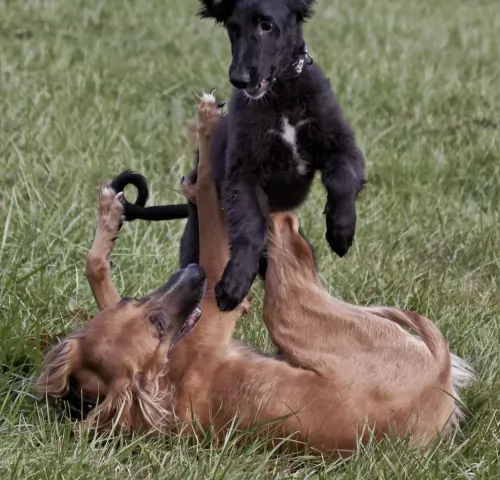 If you feed him one of the commercially manufactured dog foods, make sure its for a large, active dog breed and that it has a good list of ingredients. There are bad packaged dog foods and you want to avoid these. They are devoid of vitamins and minerals.
If you feed him one of the commercially manufactured dog foods, make sure its for a large, active dog breed and that it has a good list of ingredients. There are bad packaged dog foods and you want to avoid these. They are devoid of vitamins and minerals.
Read the packaging to see how much food to give. Also try and give your dog some home-made food too. Make sure it isn’t spicy, exotic foods. Stick to simple, wholesome foods such as boiled chicken, brown rice or pasta, sweet potatoes, spinach and carrots. Chop the food up and mix it into the dry kibble twice a week or so as a treat.
 He has a short coat and will simply require a brush twice a week. Because of the fairly large, floppy ears, he will need to have the inside of his ears checked for redness and the possibility of an ear infection.
He has a short coat and will simply require a brush twice a week. Because of the fairly large, floppy ears, he will need to have the inside of his ears checked for redness and the possibility of an ear infection.
This dog has always been used to plenty of exercise. He won’t adapt to life in the city on a tiny property. The ideal place for this dog is on a large property, preferably a farm.
Walks, hikes, swimming, ball games, hide and seek – he is a dog that can’t seem to get enough action – he wants to be in on all the action. He is intelligent and will also need mental stimulation.
If you were to buy your lean Tyrolean Hound some commercially manufactured food, you’d buy him food that was made for high energy dogs. You’d certainly want to make sure the food is of a high quality, packed with vitamins and minerals and natural ingredients.
He would also love some home-made food too. Raw meat occasionally would do him the world of good. This sort of food needs to be plain and simple such as boiled chicken, brown rice and vegetables.